热词翻译:“共商共建共享的全球治理观”英文怎么说?
“共商共建共享的全球治理观”英文怎么说?
根据热词译领导讲话翻译数据库,在《从和平共处到命运与共的历史跨越》的翻译中,“共商共建共享的全球治理观”被翻译为:
共商共建共享的全球治理观
global governance featuring extensive consultation and joint contribution for shared benefit
global governance featuring extensive consultation and joint contribution for shared benefit
例句如下:
构建人类命运共同体理念为建立公正合理的国际秩序探索正确路径,实现向共商共建共享全球治理的历史跨越。习近平总书记指出,这一理念着眼世界多极化和经济全球化的历史大势,丰富了发展和安全的新实践。世界命运应该由各国共同掌握,国际规则应该由各国共同书写,全球事务应该由各国共同治理,发展成果应该由各国共同分享。构建人类命运共同体理念倡导共商共建共享的全球治理观,践行真正的多边主义,坚定维护联合国权威和地位,坚决反对一切形式的霸权主义和强权政治。倡导平等有序的世界多极化,推动国际关系民主化,主张确保各国都能在多极体系中找到自己的位置,都能在遵守国际法前提下发挥应有的作用,确保世界多极化进程总体稳定和具有建设性。倡导普惠包容的经济全球化,推动实现增长机遇的普惠、发展道路的包容,妥善解决国家间和各国内部的发展失衡问题,实现各国尤其是发展中国家共同繁荣、共同富裕。
The Vision of Building a Community with a Shared Future for Mankind explores a right way for building a just and equitable international order, and is a historical step forward toward conducting global governance featuring extensive consultation and joint contribution for shared benefit. As pointed out by General Secretary Xi Jinping, the Vision keeps pace with the historic trend toward multipolarity and economic globalization, and inspires new ways to achieve development and security. The destiny of the world should be kept in the hands of all countries, international rules should be written by all countries, global affairs should be governed by all countries, and the fruits of development should be shared by all countries. The Vision advocates global governance featuring extensive consultation and joint contribution for shared benefit. It practices true multilateralism, firmly upholds the authority and standing of the U.N., and resolutely opposes all forms of hegemony and power politics. The Vision advocates an equal and orderly multipolar world, and promotes greater democracy in international relations. It aims to ensure that countries find their place in the multipolar system and play their role under the premise of observing international law, and that the process of world multipolarity is generally stable and constructive. The Vision advocates a universally beneficial and inclusive economic globalization, and encourages sharing of growth opportunities, accommodation of development paths, and proper solutions to global and regional imbalances, with a view to achieving common prosperity and development of all countries, especially developing countries.
The Vision of Building a Community with a Shared Future for Mankind explores a right way for building a just and equitable international order, and is a historical step forward toward conducting global governance featuring extensive consultation and joint contribution for shared benefit. As pointed out by General Secretary Xi Jinping, the Vision keeps pace with the historic trend toward multipolarity and economic globalization, and inspires new ways to achieve development and security. The destiny of the world should be kept in the hands of all countries, international rules should be written by all countries, global affairs should be governed by all countries, and the fruits of development should be shared by all countries. The Vision advocates global governance featuring extensive consultation and joint contribution for shared benefit. It practices true multilateralism, firmly upholds the authority and standing of the U.N., and resolutely opposes all forms of hegemony and power politics. The Vision advocates an equal and orderly multipolar world, and promotes greater democracy in international relations. It aims to ensure that countries find their place in the multipolar system and play their role under the premise of observing international law, and that the process of world multipolarity is generally stable and constructive. The Vision advocates a universally beneficial and inclusive economic globalization, and encourages sharing of growth opportunities, accommodation of development paths, and proper solutions to global and regional imbalances, with a view to achieving common prosperity and development of all countries, especially developing countries.
秉持公道正义,为完善全球治理贡献中国方案。坚持真正的多边主义,维护联合国权威和作用,践行共商共建共享的全球治理观,持续提升发展中国家代表性和发言权,推动全球治理架构更为均衡有效。中国将积极参与全球治理体系改革和完善,支持联合国未来峰会达成顺应时代潮流和各国人民愿望的“未来契约”,积极参与应对气候变化国际合作,围绕《全球人工智能治理倡议》凝聚更多共识,推动完善深海、极地、外空、互联网等新疆域治理规则。深化扩员后的“大金砖”国家和上海合作组织合作,支持巴西、秘鲁举办二十国集团、亚太经合组织会议,不断壮大全球治理的“南方力量”。
Upholding fairness and justice to contribute China’s proposal for better global governance. It is important to uphold true multilateralism, defend the authority and role of the United Nations, follow the vision of global governance featuring extensive consultation and joint contribution for shared benefit, continue to increase the representation and voice of the developing countries, and make the global governance architecture more balanced and effective. China will take an active part in the reform and improvement of the global governance system, support the Summit of the Future in adopting a Pact for the Future that reflects the trend of our times and the aspirations of people around the world, actively participate in international cooperation on climate change, build greater consensus on the Global AI Governance Initiative, and work for improving the governance rules for such new frontiers as deep sea, polar regions, outer space and cyberspace. It is important to deepen cooperation under the expanded BRICS and the Shanghai Cooperation Organization, support Brazil and Peru in hosting G20 and APEC meetings respectively, and augment the strength of the South in global governance.
Upholding fairness and justice to contribute China’s proposal for better global governance. It is important to uphold true multilateralism, defend the authority and role of the United Nations, follow the vision of global governance featuring extensive consultation and joint contribution for shared benefit, continue to increase the representation and voice of the developing countries, and make the global governance architecture more balanced and effective. China will take an active part in the reform and improvement of the global governance system, support the Summit of the Future in adopting a Pact for the Future that reflects the trend of our times and the aspirations of people around the world, actively participate in international cooperation on climate change, build greater consensus on the Global AI Governance Initiative, and work for improving the governance rules for such new frontiers as deep sea, polar regions, outer space and cyberspace. It is important to deepen cooperation under the expanded BRICS and the Shanghai Cooperation Organization, support Brazil and Peru in hosting G20 and APEC meetings respectively, and augment the strength of the South in global governance.
热词链接
“共商共建共享的全球治理观”在其他来源中的翻译:
1 《习近平在“上海合作组织+”会议上的讲话》中“共商共建共享的全球治理观”的翻译
第三,践行多边主义。坚持共商共建共享的全球治理观,加强团结协作,反对单边主义,坚定维护联合国地位和权威,切实发挥联合国在全球治理中不可替代的重要作用。
Third, we should practice multilateralism. We should uphold the vision of global governance featuring extensive consultation and joint contribution for shared benefit, strengthen solidarity and coordination, and oppose unilateralism. We should firmly safeguard the status and authority of the U.N., and ensure its irreplaceable, key role in global governance.
Third, we should practice multilateralism. We should uphold the vision of global governance featuring extensive consultation and joint contribution for shared benefit, strengthen solidarity and coordination, and oppose unilateralism. We should firmly safeguard the status and authority of the U.N., and ensure its irreplaceable, key role in global governance.
2 《习近平在上海合作组织成员国元首理事会第二十五次会议上的讲话》中“共商共建共享的全球治理观”的翻译
我们率先提出共商共建共享的全球治理观,践行真正的多边主义。同联合国等国际组织深化合作,建设性参与国际和地区事务,始终站在国际公平正义一边,倡导文明包容互鉴,反对霸权强权,为促进世界和平与发展发挥了积极作用。
We were the first to put forth the vision of global governance featuring extensive consultation and joint contribution for shared benefit as an effort to practice true multilateralism. We deepened cooperation with the United Nations and other international organizations, and played a constructive role in international and regional affairs. We always stand on the side of international fairness and justice, champion inclusiveness and mutual learning between civilizations, and oppose hegemonism and power politics, thus becoming a proactive force for world peace and development.
We were the first to put forth the vision of global governance featuring extensive consultation and joint contribution for shared benefit as an effort to practice true multilateralism. We deepened cooperation with the United Nations and other international organizations, and played a constructive role in international and regional affairs. We always stand on the side of international fairness and justice, champion inclusiveness and mutual learning between civilizations, and oppose hegemonism and power politics, thus becoming a proactive force for world peace and development.
3 《2025年7月8日外交部发言人毛宁主持例行记者会》中“共商共建共享的全球治理观”的翻译
毛宁:7月6日至7日,国务院总理李强在里约热内卢出席金砖国家领导人第十七次会晤。李强总理指出,当前,世界百年变局加速演进,国际规则和秩序遭受严重冲击,多边机制权威和效能减弱。习近平主席提出的共商共建共享的全球治理观更加彰显出其时代价值和现实意义。各方需要以平等尊重的态度更好共商,以团结协作的行动更好共建,以相互成就的胸怀更好共享。金砖国家作为全球南方“第一方阵”,应当坚持独立自主,努力成为推动全球治理变革的先锋力量。要坚守道义,维护世界和平安宁;要聚焦发展,壮大经济增长动能;要包容并蓄,促进文明交流互鉴。“大金砖合作”要维护和践行多边主义,致力于构建开放型世界经济,提升国际金融合作水平,开辟经济增长新蓝海。要旗帜鲜明反对单边主义和保护主义,维护产业链供应链稳定畅通。
Mao Ning: From July 6 to 7, Premier of the State Council Li Qiang attended the 17th BRICS Summit in Rio de Janeiro, Brazil. He pointed out that transformations unseen in a century are accelerating in the world, international rules and order face serious challenges, and the authority and efficacy of multilateral mechanisms are weakening. The global governance vision of extensive consultation and joint contribution for shared benefit proposed by President Xi Jinping holds even greater value and relevance. All parties need the spirit of equality and respect to enable more extensive consultation, united and collaborative actions to enhance our joint contribution, and wholehearted embrace of other’s success as our own to expand shared benefits. Standing at the forefront of the Global South, BRICS countries should uphold independence and strive to be the pioneering force in advancing global governance reform, uphold justice and safeguard world peace and tranquility, focus on development and bolster the driving forces of economic growth, and uphold inclusiveness and promote exchange and mutual learning among civilizations. Greater BRICS cooperation should safeguard and practice multilateralism. It should be committed to building an open world economy, enhancing international financial cooperation and unlocking new, promising areas in economic growth. It should unequivocally oppose unilateralism and protectionism, and keep the industrial and supply chains stable and smooth.
Mao Ning: From July 6 to 7, Premier of the State Council Li Qiang attended the 17th BRICS Summit in Rio de Janeiro, Brazil. He pointed out that transformations unseen in a century are accelerating in the world, international rules and order face serious challenges, and the authority and efficacy of multilateral mechanisms are weakening. The global governance vision of extensive consultation and joint contribution for shared benefit proposed by President Xi Jinping holds even greater value and relevance. All parties need the spirit of equality and respect to enable more extensive consultation, united and collaborative actions to enhance our joint contribution, and wholehearted embrace of other’s success as our own to expand shared benefits. Standing at the forefront of the Global South, BRICS countries should uphold independence and strive to be the pioneering force in advancing global governance reform, uphold justice and safeguard world peace and tranquility, focus on development and bolster the driving forces of economic growth, and uphold inclusiveness and promote exchange and mutual learning among civilizations. Greater BRICS cooperation should safeguard and practice multilateralism. It should be committed to building an open world economy, enhancing international financial cooperation and unlocking new, promising areas in economic growth. It should unequivocally oppose unilateralism and protectionism, and keep the industrial and supply chains stable and smooth.

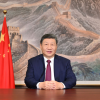 国家主席习近平发表二〇二六年新年贺词
国家主席习近平发表二〇二六年新年贺词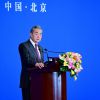 在历史演进重大关头开拓中国特色大国外交新境界
在历史演进重大关头开拓中国特色大国外交新境界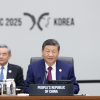 习近平在亚太经合组织第三十二次领导人非正式会议第一阶段会议上的讲话
习近平在亚太经合组织第三十二次领导人非正式会议第一阶段会议上的讲话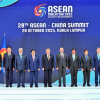 李强在第28次中国—东盟领导人会议上的讲话
李强在第28次中国—东盟领导人会议上的讲话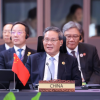 李强在第20届东亚峰会上的讲话
李强在第20届东亚峰会上的讲话